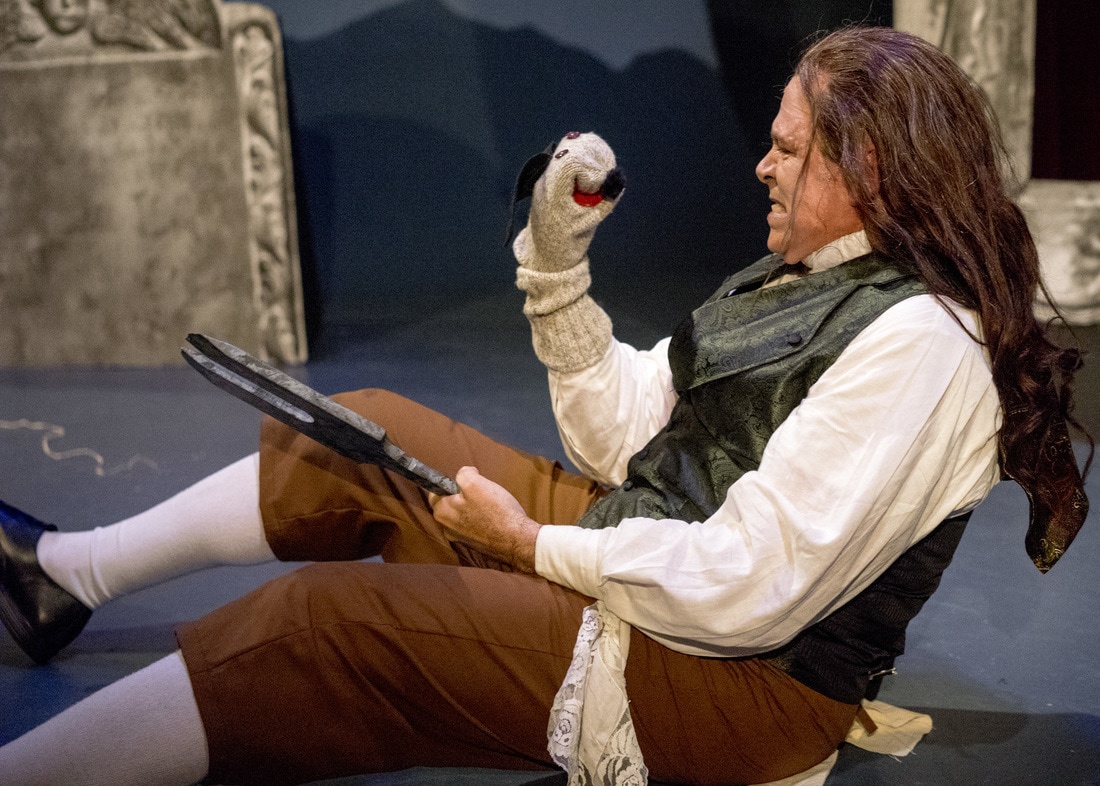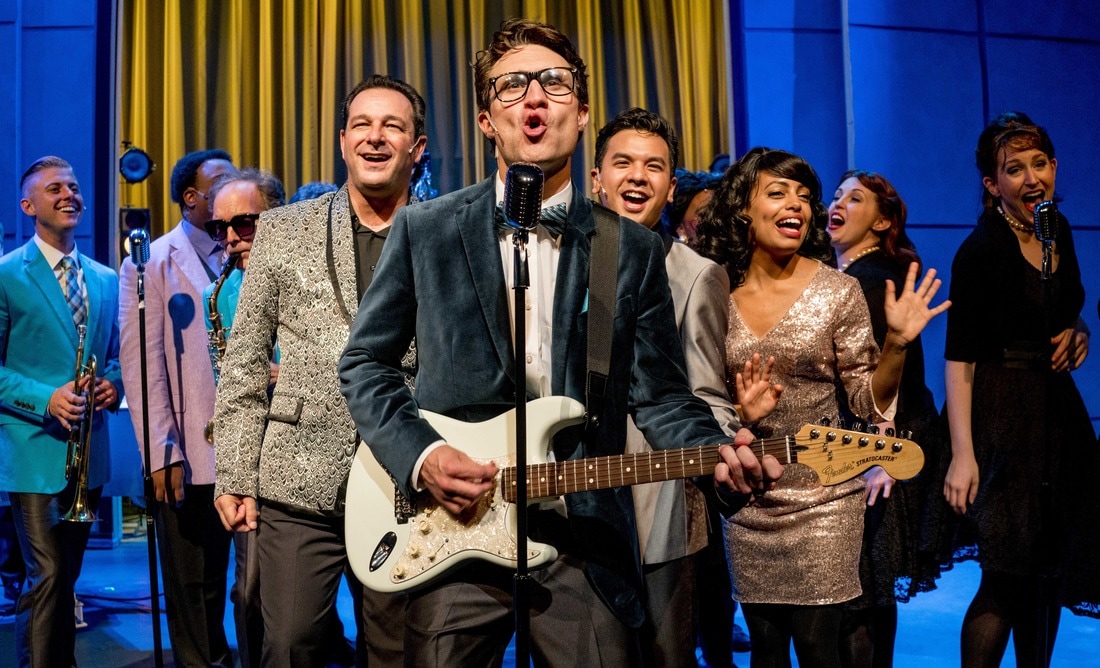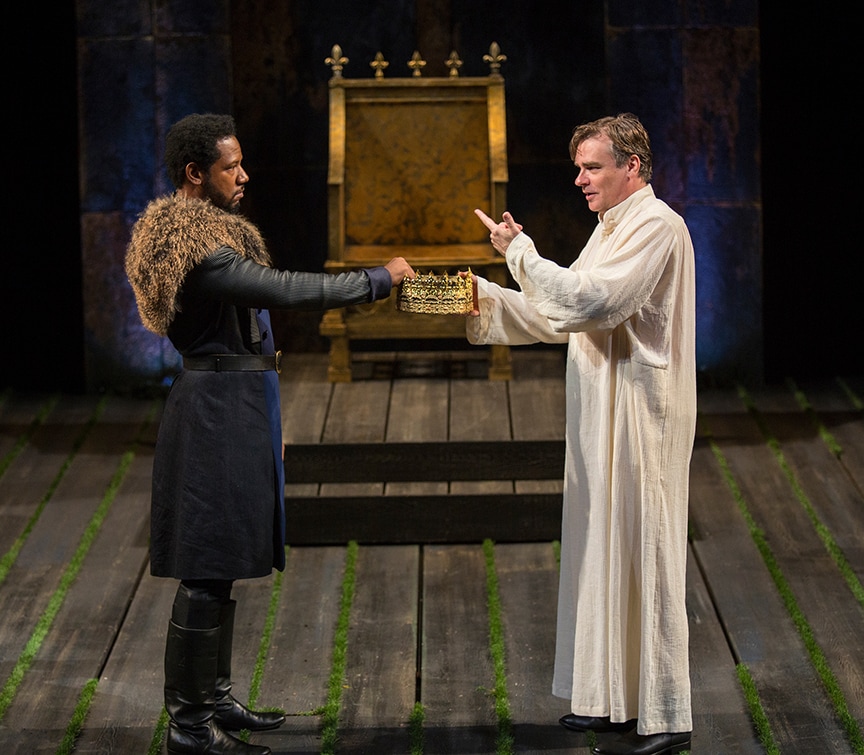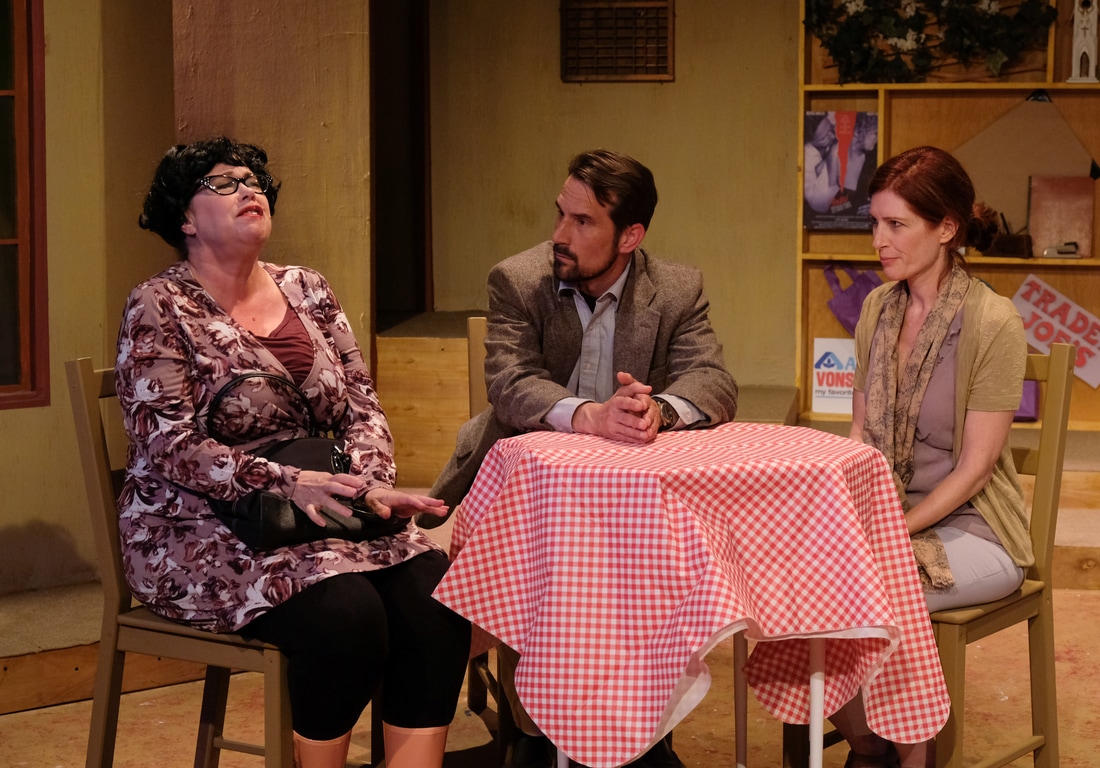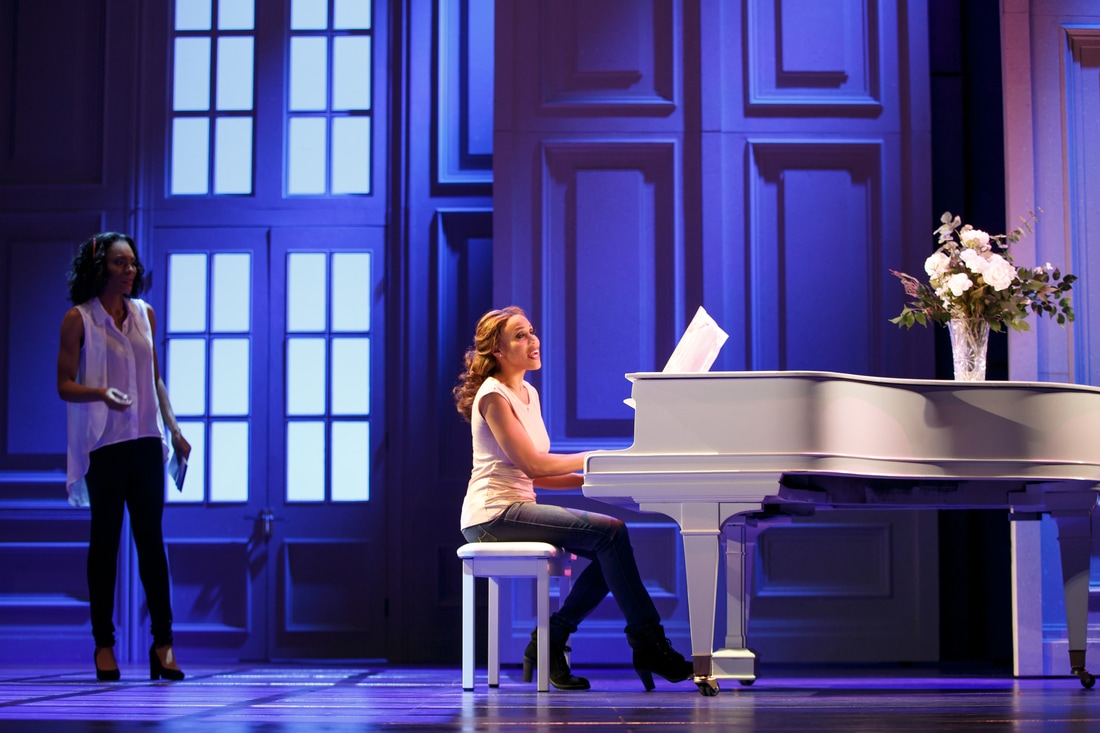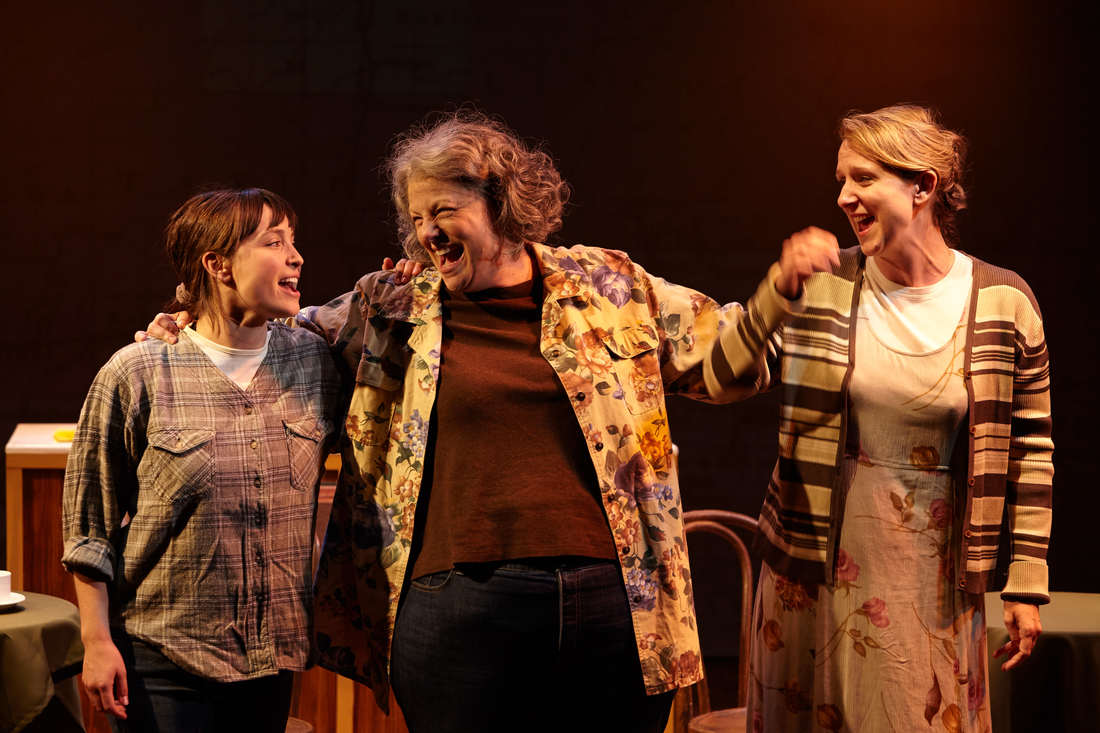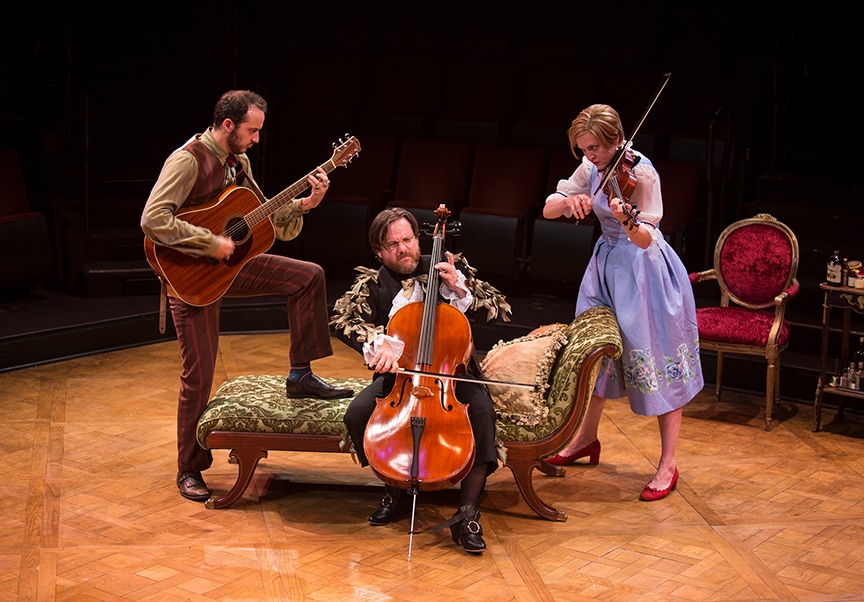|
Phil Johnson in "Withering Heights" Photo courtesy of The Roustabouts Let Emily Bronte spin in her grave. Phil Johnson and Omri Schein’s two-man spoof Withering Heights is a helluva lot more entertaining than Bronte’s one and only 19th-century novel. Johnson is a co-founder of the fledgling Roustabouts company that is presenting Withering Heights on Diversionary Theatre’s stage, In this exercise in inspired silliness, he and Schein do quick-change duty as Bronte’s Gothic characters, including, of course, star-crossed lovers Catherine (Schein) and Heathcliff (Johnson). The North Coast Rep’s David Ellenstein directs the swiftly paced antics, which sometimes descend into flatulence humor but in large part demonstrate Johnson and Schein’s cleverness at parodying Bronte’s melodramatic story. What might be tedious in lesser hands is giddily sustainable for an hour and 20 minutes. Try getting through the novel in that time. Try getting through the first chapter in that time. (Review originally published in San Diego CityBeat on 6/28/17)
0 Comments
Paul Swensen Eddy (center) stars in "Buddy: The Buddy Holly Story." Photo by Daren Scott You’d have to be a puritan or a rock ‘n’ roll hater or both not to enjoy Buddy: The Buddy Holly Story, Alan Janes’ ’89 jukebox musical about the bespectacled legend from Lubbock, Texas. Before the proceedings turn overly talky with developments in the second act (i.e. Buddy’s whirlwind marriage and his split from the Crickets), this show co-produced by Intrepid Theatre Company and New Village Arts Theatre is in essence a concert performance of Buddy Holly classics like “That’ll Be The Day,” “Peggy Sue” and “Oh Boy.” Paul Swensen Eddy makes an appealing Buddy, and he’s raucously supported by Manny Fernandes as the Big Bopper and Shaun Tuazon as Ritchie Valens.
Rock ‘n’ rollers mostly over 50 will dig this show, but those younger should hear in Buddy Holly’s songwriting and guitar craft the inspiration for rock artists of all stripes (even punkers) who followed. Kudos to the musicians in this production, some of them on stage acting as well, who rock the house. Buddy: The Buddy Holly Story is a trip back in time worth taking. (Review originally published in San Diego CityBeat 6/28/17) Torry Kittles (left) and Robert Sean Leonard in "King Richard II" at the Old Globe. Photo by Jim Cox. From then-President-elect Trump’s insistence last November that theater be a “safe” place to the recent right-wing excoriation of a New York production featuring a Trump-like “Julius Caesar,” the theatrical stage has been in the crosshairs of the new presidency’s disregard for, and even rancor over, the arts. While the Old Globe announced its 2017 Summer Shakespeare Festival season before The Donald was elected, it’s nonetheless providential that the opening production happens to be King Richard II. A grim but poetical play immersed in questions of power, entitlement and betrayal, it’s a fitting and topical vehicle for this Summer of Bob Mueller.
Even without making contemporary correlations, King Richard II is cracking good political theater. Written in verse, this Shakespeare history (an anchoring point for the subsequent Henry IV, Part 1, Henry IV, Part 2 and Henry V) pits King Richard II (Robert Sean Leonard), who believes he wears the crown by divine right (or mandate?), against his cousin Henry Bolingbroke (Tory Kittles), who with righteousness and an army of rebellious allies seeks to depose the weak king. The future not only of England but of those bound to either man by blood or loyalty is at stake. Erica Schmidt directs a production on the Globe’s outdoor Lowell Davies Festival stage that rightly focuses on the inevitability of Richard’s fall and, more so, the damage from his usurpation to his faith and to the very core of his inner self. This is clearest and most profound late in the second act, with Leonard intuitively portraying a man, not a ruler ordained by God, whose fate is foredoomed. Kittles’ Bolingbroke is by contrast more measured, though he effects little charisma. But both Charles Janasz’s fiery John of Gaunt and Patrick Kerr’s excitable Duke of York enliven each scene in which they appear. From a visual perspective, John Lee Beatty’s monolithic castle-wall set is apt and imposing, and Andrea Lauer’s costumes are evocative down to the finest detail. With its lone duel in armor aborted early, the language-heavy King Richard II can be plodding. Its conflicts are those of conscience – not always the loudest, but often the most searing. (Review originally published June 21 in San Diego Citybeat.) Dana Hooley, Francis Gercke and Tori King Rice in "Loves and Hours." Photo by Ken Jacques The loves in Stephen Metcalfe’s Loves and Hours are of the May-December variety: Near-50 Dan Tilney (Francis Gercke) is in love (or at least in lust) with barely over 20 Charlotte (Taylor Henderson). Dan’s medical-student daughter Rebecca (Beth Gallagher) is in love with an over-40 doctor named Walter. His college-age son, Dan Jr. (Jake Rosko), is in love (and/or in lust) with neglected – and older -- married woman Sara (DeNae Steele). Even his best friend Harold (Paul Maley) is a newlywed: to a young woman named Andrea (Sofia Sassone) who is half his age. These let’s call them sophisticated relationships may be too hip for audiences at Scripps Ranch Theatre, where Loves and Hours runs through July 2 under the direction of Gercke. (I overheard an older gentlemen sitting near me at a matinee say: “I never knew women were so forward.”) But at the core of it, Loves and Hours isn’t very daring. It’s sitcom-ish in a sleeping around kind of way, and ultimately it celebrates love for what it is: THE FEELING that we all want, right?
Metcalfe’s exposition relies on frequent monologues from Gercke in the title role, foreshadowing, reflecting on and second-guessing not only Dan’s romantic strategies but those of everyone else in his sphere. Almost forgot to mention Dan’s ex-wife, Linda (Dana Hooley), who divorced him after realizing she was gay. If Loves and Hours’ plot sounds overly busy and overly coincidental, it’s because it is. That, along with the reliance on monologue, are its issues. But frankly they’re overcome by an excellent cast at Scripps Ranch Theatre that features not only Gercke himself (very believable in Dan’s doubt-ridden skin) but also Maley as the hapless sugar daddy Harold, Beth Gallagher as daughter Rebecca (in a role that should be bigger) and Hooley, reliably hilarious here as she is in most everything she appears in. The play’s most sympathetic and genuine character is Dan’s platonic friend Julia (Tori King Rice), whose concept of true love is the purest. Rice is warm and smart and vulnerable in the part, too, qualities that foster an ambiance for a satisfying conclusion. Jasmin Richardson (left) and Deborah Cox in "The Bodyguard The Musical." Photo by Joan Marcus “The Bodyguard The Musical” begins in darkness with the startling sound of a gunshot, a rather unsettling moment for theatergoers given recent events in the news. But once the stage lights come up, the tension vanishes and this five-year-old adaptation of the 1992 motion picture concentrates on simply entertaining its audience with the songs of Whitney Houston, romance and relatively benign melodrama.
Alexander Dinelaris’ book doesn’t tray too far from the well-remembered film that starred Houston and Kevin Costner, a tale about a Grammy-winning singer who’s being stalked by a psycho, and the hunky bodyguard hired to protect her. The stage show presented by Broadway San Diego emphasizes the Rachel Marron character over the bodyguard’s, unlike in the movie, but that makes sense because this is, after all, a musical. Deborah Cox belts out Houston hits like “I’m Every Woman,” “Greatest Love of All,” Run to You” and, inevitably, “I Will Always Love you,” with ardency. A veteran of both “Aida” and “Jekyll & Hyde” on Broadway, the R&B/pop artist is no stranger to the boards. An added treat in this touring production is Jasmin Richardson, portraying Rachel’s troubled but talented sister, Nicki. Her vocals are wistfully reminiscent of Dionne Warwick, a cousin of Whitney Houston, of course. As Frank Farmer, the laconic bodyguard, Judson Mills is mostly a modern-day Matt Dillon in a suit, though he does well with the meager bits of humor given him, such as at a karaoke bar. That scene, with Cox’s Rachel surprising the unsuspecting customers with a cameo performance, is the most genuine and most fun in “The Bodyguard The Musical.” The business with the homicidal stalker (Bradford Rahmlow) is strictly formulaic. Even at its most intentionally sinister, it takes a back seat to Cox’s full-throated rendering of Houston’s tunes and the electric choreography by Karen Bruce. “The Bodyguard The Musical” continues through Sunday at the Civic Theatre downtown. L to R: Aurora Florence, Devlin and Meghan Andrews in "The Spitfire Grill." Photo by Aaron Rumley Whether in mid-song or mid-sob, Aurora Florence is the life force behind North Coast Repertory Theatre’s production of The Spitfire Grill, a sincere, often-sad 2001 musical adaptation of a 1996 film. Florence, an original member of the alt-rock band Imagine Dragons, is Perchance (Percy) Talbott, recently out of prison and doing a different kind of time in a small Wisconsin town where secrets are kept, gossip flows freely and people drop their g’s when they’re talkin’. How Percy comes to transform them all is the crux of the show by James Valq and Fred Alley, which gets a heartfelt staging at the North Coast Rep under Jeffrey B. Moss’ direction. The women’s parts are the best written in this musical, and the female characters enjoy the best songs, too. Taking advantage besides Florence are Meghan Andrews, the single-named Devlin as the Spitfire’s spit-and-vinegar owner, and in a wee but howling part as the town gossip, Maggie Carney. (Review originally published in San Diego CityBeat on 6/14/17.)
Members of Fiasco Theatre in "The Imaginary Invalid" at the Old Globe. Photo by Jim Cox The appeal of Fiasco Theater’s artistry is the complete delight with which its troupe members perform and create on stage. Three years after their well-received production of Into the Woods at the Old Globe, the Fiasco players are back with an even finer offering, their adaptation of Moliere’s The Imaginary Invalid. You may have seen before this 17th-century farce about a hypochondriacal father and the daughter he seeks to marry off, for purely self-interested reasons, to a dolt of a doctor. But odds are you’ve never seen it like this, with the Fiasco ensemble (directed by cast members Jessie Austrian and Noah Brody) performing original music (by Ben Steinfeld), and invigorating this old comedie-ballet to the point that it feels spontaneous and new.
Aside from the Act 2-opening scene in which the “invalid” (Andy Grotelueschen) and his brother (Paul L. Coffey) debate his ridiculous hypochondria, the production moves along rapidly and happily. There’s a keen sense that the Fiasco gang (which also includes Kevin Hafso-Koppman, Jane Pfitsch and Emily Young) is a having a helluva good time. So will you. The aftermath of a fifth-grader’s suicide, realized in a visceral confrontation between the boy’s grieved but hostile mother (Jyl Kaneshiro) and his stricken teacher (Carla Nell), consumes the 75 tense minutes that is Johnna Adams’ Gidion’s Knot, running through Saturday at Diversionary Theatre’s Black Box space. You’ll be consumed, too, by this brutal, claustrophobic play’s disturbing and violent imagery. The propped-up debate about creative freedom in the classroom (and of childhood) is never really a debate at all as the mother resorts to cruelty while the teacher sobs and submits. InnerMission Productions’ Gidion’s Knot spares none of Adams’ ferocity. It makes for a discomfiting after-school experience, even without the presence of the principal. (Originally reviewed in San Diego CityBeat on 6/7/17)
Lauren Gunderson’s meta-theatrical, contemporary-voiced Revolutionists imagines a 1790s France awash in violence and blood in which activist playwright Olympe de Gouges (Jo Anne Glover) is struggling to articulate the turmoil in her homeland and stand up for her gender. In the process, she encounters the deposed Marie Antoinette (Lisel Gorell-Getz) and a political assassin (Samantha Ginn), both of whom want their stories told as the guillotine looms. Olympe’s best friend, Marianne Anelle (Cashae Monya), is a composite character based on Gunderson’s research into the concurrent Haitian Revolution. Perhaps not coincidentally, this character’s conviction throughout the play resounds loudest.
Directed at Moxie Theatre by Jennifer Eve Thorn, The Revolutionists, in spite of its historical setting, is a hip and relevant comedy replete with self-conscious quips about writing, theater, even audiences. Yet its sober side, that devoted to justice, personal liberty and women then and now standing up for themselves, is charged and insightful. What might be awkward exposition succeeds on the basis of a resourceful cast unafraid of operating in both worlds. Further enhancing this production are scenic and projection design by Emily Small, Jennifer Brawn Gittings’ period costumes and, of course, Gunderson’s incisive script. (Initially published in San Diego CityBeat on 6/7/16) |
AuthorDavid L. Coddon is a Southern California theater critic. Archives
July 2024
Categories |
David Coddon |
|
